Even the most savvy of business owners have made mistakes. James Schramko and Charley Valher don’t claim to be authorities, but they do have past mistakes in their journeys that other people can learn from.
In this episode, they bravely share these slip-ups in the hopes that would-be wealth builders in the audience can avoid them.
Podcast: Download (Duration: 44:20 — 44.3MB)
Get Notified Of Future Episodes Apple Podcasts | Spotify | Amazon Music | Android | Blubrry | Gaana | TuneIn | Deezer | Anghami | RSS | More
Disclaimer: Neither Charley nor James are offering financial advice. This is a discussion and opinion only. Please consult a professional financial advisor for your own situation.
Editing note: Charley’s site is now Business & Investing
James Schramko and Business & Investing’s Charley Valher know: among the best ways to avoid failure is to know what others have done wrong. That’s why in this episode they share their wealth-building mistakes, hoping to help listeners side-step some potholes.
Charley cautions against overoptimism in business, where the eagerness to make money could actually be your undoing.
James discusses why partnership might not be the best business model.
And the two talk about the harm of having a scarcity mindset around money.
Table of contents
1. Learning from others’ mistakes
2. Beware of overoptimism
3. When your marketing works too well
4. Sometimes a partnership is a mistake
5. How bad experience can lead to good
6. Living in fear of financial lack
7. Are you shortchanging your team members?
8. Letting emotion get the better of you
Learning from others’ mistakes
In his Business & Investing community, Charley helps equip business owners to build wealth. And often he’s asked what kind of mistakes one needs to avoid.
He believes it’s enormously helpful to share mistakes and prevent people from committing the same. Given, some people like to learn from experience, but if you can learn from what other people have done, it’s much more advantageous.
When it comes to money, says James, it’s much better to learn from others. He thinks the mantra of fail fast, fail often, is terrible – why fail at all, if you can avoid it?
He has lost money, however, and so has Charley, and the two will be sharing some war stories in this episode.
Beware of overoptimism
In the early days of his marketing agency, Charley struggled to find a winning offer. After years of trying, however, he finally found something the market wanted.
The increase in business was the equivalent of going from $10,000 a month to $70,000, in the space of just two to three months.
In his excitement, Charley figured he could get paid up front and then work out the delivery. So he said yes to a mass of work and then went about drastically hiring people to fulfill.
Then there was the fact that in agencies, the first few months with the client are the most expensive ones – this created a massive cash vacuum. Revenue went up, but Charley lost all the cash in his business and couldn’t even afford to pay himself for six months.
A secondhand consequence of that was that Charley became more reserved going forward, foregoing some of the business opportunities that presented themselves. Capacity sabotage, James calls it.
One factor was that Charley hadn’t much experience at the time. James can recall the basic, crucial knowledge he lacked when he first sold a website – it was stressful, but he also figures it’s good to reconnect with that sort of beginner situation where you don’t know all the answers.
When your marketing works too well
James has had his own experience of too much business and not enough capacity to deliver.
When he quit his job in 2008, his income was a combination of affiliate marketing, information product selling, and a couple of agency clients.
The CPA marketing he did was really taking off. He was up to $5,000, $6,000, $7,000, $8,000 a day in ad spend on his AmEx, promoting primarily one offer on a variety of platforms.
One day James ticked on the Display Network option, the banner ad option for Google, and it went crazy. He outsold all the other CPA networks, not just the individuals but the networks, and overnight made $16,000 in sales.
The company got so many orders, they couldn’t fulfill. Their reputation suffered; people did chargebacks, thought they were a scam; they ended up collapsing.
James was caught with the bill for his ad spend, which he never got paid for. The commission check stopped; he’d earned money which just didn’t come because the business had gone broke.
A few lessons: first, James was single-source dependent for most of that income. There was a lead time between when he spent the money and when he got paid back.
And it wasn’t enough – he didn’t have enough other in his portfolio for it not to be annoying. In the end, the rest of his business balanced out the costs, but it did bottom him out for a month or so.
Sometimes a partnership is a mistake
James’s second financial mistake relates to partnerships.
He started a membership in 2009 with the help of a brilliant student of his. In hindsight, he says, he should have hired someone to do the short-term, one-time things this person did – choose a membership platform and billing solution, set up a presale page and connect the autoresponder waiting lists.
Instead, James went into it 50:50, on the agreement that they would both bring in clients.
James filled the membership with the first cohort of people, and he kept speaking at events and filling it. In 2009 they were making roughly $25,000 a month and making 10 grand each after affiliate fees.
It went on for about four years. James answered about 80 to 85 percent of the questions in the membership, and brought in 99.99 of all members.
James realized he could have paid much less to just get help setting things up, and felt the need for independence. He tried a number of approaches – offered to sell his share, or buy out his partner’s share for a generous amount; he suggested adjusting the split, 65:35 or 60:40.
When his partner said he was just happy the way things were, James left and started his own community. After a few months, all their existing members had come across to him, and the old community had to switch off.
James then enjoyed total independence and four times the profit. But by leaning too heavily into the partnership, hoping that it would work out and not calling it early enough, he overpaid for too long, when he should have called it earlier.
How bad experience can lead to good
It’s interesting, says Charley, that many bad experiences can lay up the next good thing. In James’s case, it led ultimately to his current business model, which has earned him a recurring income since 2009.
And it gave him an appreciation for the fact that he’s more of a one-man wolf pack. He doesn’t need 50:50 partners, except in marriage, which is a different consideration altogether.
It fits with his OwnTheRacecourse methodology – he likes to have a lot of control, but he’s also prepared to take a lot of responsibility. He’ll own it if it doesn’t work, but he’ll also own it if it works.
Now he also pursues a revenue share model, which he likes. It’s taking a tiny percentage of someone else’s business, which the other person owns and controls and makes decisions for.
James’s revenue share partners can take or leave the advice he gives, and if they no longer like the setup, they can end by buying it out.
Mistakes are going to happen. James loves his previous episode with Nam Baldwin, who says about mistakes: it’s normal, expect it, accept it, and then tidy up – the NEAT acronym.
That acronym changed things for James. But he’d already learned before that in business and life that a mistake is just an investment in experience.
Living in fear of financial lack
Charley’s second financial mistake is that he never got educated about money early in his life. And he’d had experiences growing up where his family wasn’t in the best financial position, so he developed quite a fear-based or a scarcity mindset around money.
When Charley made money, even when he wasn’t struggling for every dollar, he’d squirrel it away, reluctant to invest it in any way. What he would do, though, was pay down his mortgage – he paid off his house by the time he was 30.
Later Charley realized the opportunity cost of not being educated about money. And looking at what could have happened had he invested, he saw that he’d actually hamstrung himself in a big way, leaving a lot on the table.
One thing that snapped him out of it was a marketing event in Sydney. It was held in a very nice hotel, and instead of staying at that hotel, Charley stayed at a friend’s house to save money.
At the event he found himself lying to people, saying he wanted to catch up with his friend rather than stay at the hotel. And he missed out on key experiences, networking and the like, when he’d leave for his friend’s house.
That triggered Charley to do some work on himself, part of which was Dr. John Demartini’s program on money. That unlocked his ability to function better with money in the world.
James recalls a multi-millionaire client of his, who wore stained secondhand clothes and drove secondhand cars. James works with a lot of people who are not in dire financial straits, yet still hang on to old money patterns that cause them to play small.
Are you shortchanging your team members?
James had a client recently mention to him that he had an incredible worker, who he felt deserved a pay bump. This worker, he said, asked for $8,000, but he was paying him four.
Why, asked James? It was an old money mindset habit, said the client, to just be cheap.
Would you miss them if they left, asked James? I’d be devastated, said the client. Well, there you go, James said. Pay them $8,000.
This person, said James, could never hold staff, because he was always trying to nickel and dime them, something you do not want to do to your staff.
Charley agrees completely. Pay your people well if they’re good.
Letting emotion get the better of you
The next example is a more recent one for Charley.
He had just had an investment property go really well for him, his first proper deal, he’d say. He was in an exaggerated, joyous state, and his instinctive reaction was, let’s go again.
He hired the team to set things up again, and sure enough, they found a property, which they presented to him. At that point, however, the world had changed.
They were going through their second lockdown then, with some real concerns about the future of humanity. Charley went from the high of his successful property deal to an incredible low of fear and despair – and he passed on the property.
If Charley had purchased that property, it would have done really well. His big mistake was acting purely on emotion. And that, he feels, is dangerous.
There have been other instances, he says, which may or may not have been crypto-related, where he was emotional and got into things he didn’t truly understand. And whenever he lets emotion get to him instead of sticking to plan or more long-term strategic moves, it tends to go sideways.
It’s a forgivable thing, says James.
In his case, during that time, he watched the bank stocks dive, and purchased a substantial amount at half the share price. It was a matter of betting against the general emotion, and looking for the opportunity that had to be there.
James and Charley’s financial mistakes could run into the hundred of thousands of dollars – are they investments in experience? James thinks so.
Have these mistakes helped them both make better choices in the future? Absolutely.
Access a wealth of business resources and support inside the James Schramko membership
Enjoyed the show? Leave us a review on iTunes

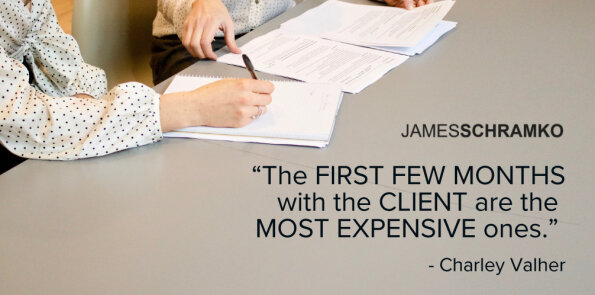
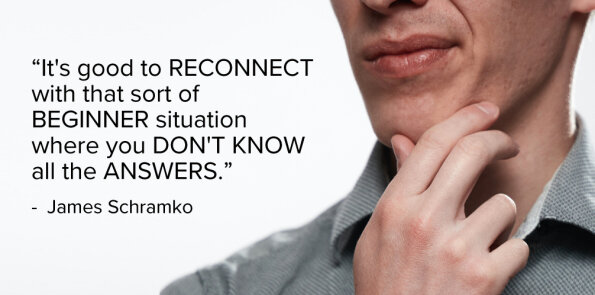
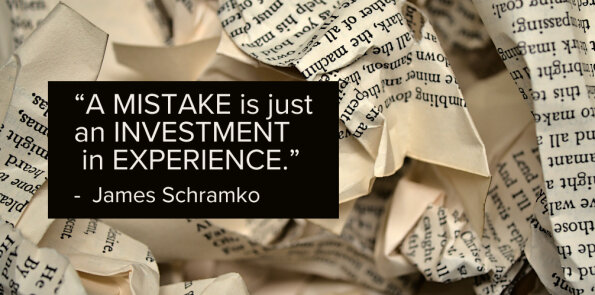
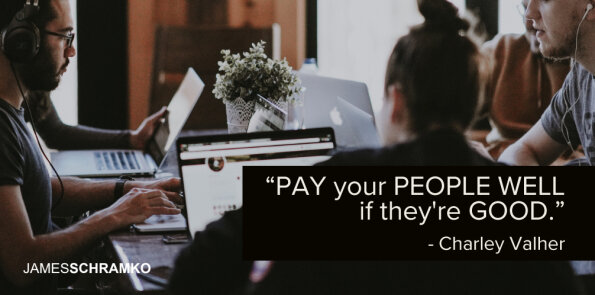

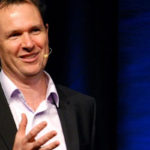





Leave a Reply